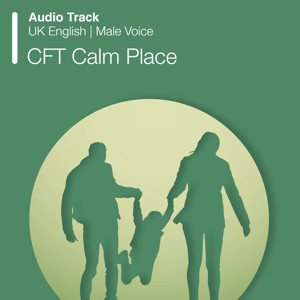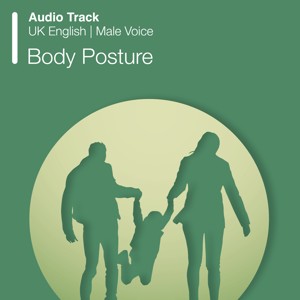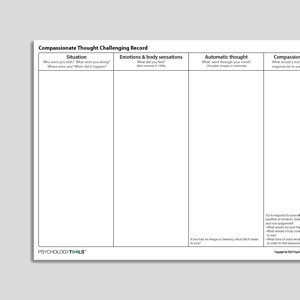Self-compassion
“Self-compassion entails being kind and understanding toward oneself in instances of pain or failure rather than being harshly self-critical; perceiving one’s experiences as part of the larger human experience rather than seeing them as isolating; and holding painful thoughts and feelings in mindful awareness rather than over-identifying with them” (Neff, Kirkpatrick, & Rude, 2007). Gilbert’s evolutionary account of compassion argues that the self-soothing qualities of self-compassion allow for more effective affect regulation, greater capacity for intimacy, and more adaptive behavior (Gilbert, 1989, 2005). Many individuals who have experienced neglect or abuse struggle to offer compassion toward themselves and struggle with shame and self-criticism as a result. Within compassion-focused therapy (CFT) techniques for fostering and developing self-compassion are referred to as compassionate mind training (CMT).
Audio Collection: Psychology Tools For Developing Self-Compassion
Audio Collection: Psychology Tools For Developing Self-Compassion
What Is Compassion, Why Do I Need It, And How Might It Help Me?
What Is Compassion, Why Do I Need It, And How Might It Help Me?
Receiving Compassion From Your Ideal Other
Receiving Compassion From Your Ideal Other
Trying On The Qualities Of Compassion
Trying On The Qualities Of Compassion
Combining Soothing Breathing With A Soothing Smell
Combining Soothing Breathing With A Soothing Smell
Breathing To Activate Your Soothing System
Breathing To Activate Your Soothing System
Grounding Techniques Menu
Grounding Techniques Menu
Responses To Threat: Freeze, Appease, Flight, Fight
Responses To Threat: Freeze, Appease, Flight, Fight
Motivational Systems (Emotional Regulation Systems)
Motivational Systems (Emotional Regulation Systems)
Progressive Muscle Relaxation (Archived)
Progressive Muscle Relaxation (Archived)
Coercive Methods For Enforcing Compliance
Coercive Methods For Enforcing Compliance
Compassionate Thought Challenging Record
Compassionate Thought Challenging Record
Barriers Abusers Overcome In Order To Abuse
Barriers Abusers Overcome In Order To Abuse
Links to external resources
Psychology Tools makes every effort to check external links and review their content. However, we are not responsible for the quality or content of external links and cannot guarantee that these links will work all of the time.
Case Conceptualization / Case Formulation
- Formulation in Compassion Focused Therapycompassionatemind.co.uk
- Training our minds in, with, and for compassion: an introduction to concepts and compassion-focused exercisescompassionatemind.co.uk
Exercises
- Compassionate letter writing | Paul Gilbert | 2010
- Writing a compassionate letter to myself
- Compassionate Letter Writing (Therapist Notes and Client Handout) | Paul Gilbert | 2007
- Building a compassionate image | Compassionate Mind Foundation
Guides and workbooks
- How to develop self-compassion | Russ Harris
Information Handouts
- What Is Self-Compassion? | Centre For Clinical Interventions
- The RAIN of self-compassion | Tara Brach
Information (Professional)
- Healthy emotion regulation strategies pyramid | Alice Boyes | 2011
Presentations
- An Introduction to the Theory & Practice of Compassion Focused Therapy and Compassionate Mind Training for Shame Based Difficulties | Paul Gilbert | 2010
Self-Help Programmes
-
Building Self-Compassion (Workbook)
| Centre For Clinical Interventions | 2017
- Module 1: Understanding Self-Compassion
- Module 2: Barriers To Self-Compassion
- Module 3: Preparing For Self-Compassion
- Module 4: Compassionate Imagery
- Module 5: Self-Compassionate Thinking
- Module 6: Self-Compassionate Behavior
- Module 7: Self-Compassionate Living
Treatment Guide
- Compassionate Friend Group: Facilitator manual | Isabel Clark
- The ‘Compassionate Friend’ group: A 3 session group designed for use in a ward environment | Isabel Clark
Video
- Paul Gilbert – CFT Workshop at CCARE (part 2)youtube.com
- Compassion, anger, strength, and moral indignation | Russel Kolts | 2020
- Relating to voices using CFT | Charlie Herriot-Maitland
- The compassionate kit bag | Kate Lucre, Neil Clapton | 2019
-
CFT Workshop at CCARE
| Paul Gilbert | 2013
- Part 1
- Part 2
- Part 3
- Part 4
- Paul Gilbert – DCP Lecture 2015 – Tragedies of the human mindyoutube.com
- Paul Gilbert – CFT Workshop at CCARE (part 4)youtube.com
- Paul Gilbert – CFT Workshop at CCARE (part 3)youtube.com
- Paul Gilbert – CFT Workshop at CCARE (part 1)youtube.com
- Paul Gilbert – Meng Wu Lecture (Introductory)youtube.com
Websites
- Exercises to increase self compassion | Neff, K.
Recommended Reading
- Goss, K., & Allan, S. (2010). Compassion focused therapy for eating disorders.International Journal of Cognitive Therapy,3(2), 141-158
- Compassion Focused Therapy – Procedure Outline
- Gilbert, P. (2009). Introducing compassion focused therapy.Advances in Psychiatric Treatment, 15, 199-208
References
Gilbert, P. (1989). Human nature and suffering. Hillsdale, NJ: Lawrence Erlbaum.
Gilbert, P. (2005). Compassion and cruelty: A biopsychosocial approach. In P. Gilbert (Ed.), Compassion: Conceptualisations, research and use in psychotherapy(pp. 9–74). New York: Routledge
Neff, K. D., Kirkpatrick, K. L., & Rude, S. S. (2007). Self-compassion and adaptive psychological functioning. Journal of Research in Personality, 41(1), 139–154.








































